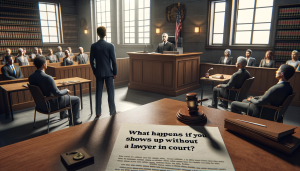Understanding the Legal Concept of Pleading Guilty in an accident
What It Means to Plead Guilty in a Legal Context
In legal parlance, pleading guilty signifies an admission of guilt for the crime or violation at hand. When you plead guilty, you are essentially confessing that you have committed the crime or violation specified in the charge. It's akin to confessing directly to the court that you're responsible for the actions in question. This plea means that the court can proceed straight to sentencing, bypassing the need for a trial or further investigations.
The Implications of a Guilty Plea
When you enter a guilty plea, it has significant legal implications. Essentially, by admitting guilt, you surrender many of your rights in the justice process, like the right to a trial and the right to cross-examine witnesses. You also waive your right to appeal the conviction, as you've admitted to the crime. Your plea becomes part of your criminal record, which could influence the outcome of any future legal issues or proceedings.
Factors to Consider Before Pleading Guilty
There are several factors to consider before entering a guilty plea. First, you should fully understand the crime you're being charged with and how your plea will affect your legal situation. Next, consider the evidence against you. A strong case with substantial evidence might influence your decision to plead guilty. Lastly, understand the potential penalties and their long-term effects. For instance, a particular offense may carry a prison sentence, fine, or other sanctions, which can impact your life significantly.
Pleading Guilty in the Context of an Accident Case
In the context of an
Accident case, pleading guilty might have serious consequences. For instance, if you're held responsible for a car crash, a plea of guilty can lead to severe penalties such as the suspension of your driving license or hefty insurance premiums. Also, it could affect any related civil lawsuits for damages, as your admission of guilt could be used as evidence in these cases.
Legal Advice and Representation in Guilty Pleas
Before deciding to plead guilty, especially in an
Accident case, it's essential to seek legal counsel. An experienced attorney can explain the implications of your plea, review the evidence against you, and offer advice on whether pleading guilty is in your best interest. They will also represent you during sentencing, striving to achieve the most favorable outcome possible. Don't underestimate the value of competent legal representation when dealing with matters as significant as a guilty plea.
Immediate Consequences of Pleading Guilty in an Accident
Potential Impact on Your Criminal Record
When you plead guilty to a crime, it is typically reflected in your criminal record. This means that even if the accident was minor, a guilty plea can result in you having a permanent criminal record. This could potentially affect your future, including potential employment opportunities where employers run background checks.
Influence on Insurance Premiums
Being at fault in an
Accident and pleading guilty may lead to an increase in your insurance premiums. Most insurance companies take into account your driving history when calculating your costs. Therefore, a guilty plea could be seen as an admission of unsafe driving habits, causing your rates to rise.
Effect on Civil Liability
In many jurisdictions, a guilty plea in a criminal case related to an accident can be used as an admission of liability in any subsequent civil lawsuit. This could potentially expose you to significant financial liability in the form of compensatory and possibly punitive damages claimed by other individuals involved in the accident.
The Possibility of Penalties
Depending on the severity of the
Accident and jurisdiction, pleading guilty can result in a range of penalties. These can include fines, probation or in some severe cases, imprisonment. Pleading guilty without understanding the full depth of the potential consequences could put you at risk of receiving harsher penalties.
Restriction on Travel
A guilty plea can impact your opportunities to travel internationally. Some countries may deny entry to individuals with specific types of convictions on their criminal record. The severity and type of accident you plead guilty to could significantly impede or restrict your ability to travel abroad.
Long-term Implications of a Guilty Plea in an Accident Case
Impact on Criminal Record
When a person pleads guilty to an accident case, that plea becomes part of their permanent criminal record. This means that any future employers, landlords, or lending institutions that conduct a background check will be able to see this conviction. This could significantly impact your ability to secure employment, housing, or loans, as you may be viewed as a liability.
Effect on Driving Privileges
Depending on the severity of the accident or if it's a repeat offense, a guilty plea can result in a suspension or complete revocation of your driving privileges. Often, the length of the suspension corresponds with the severity of the incident and your past driving history. In some instances, mandatory completion of driver-safety courses or other rehabilitation efforts may be required before reinstatement of your license.
Insurance Consequences
A guilty plea can also have lasting implications for your car insurance premiums. Insurance companies typically view drivers with convictions as high risk. As a result, they increase policy rates—sometimes substantially—to reflect that elevated risk. This hike in car insurance premium can persist for years after the conviction, significantly increasing the lifetime cost of car ownership.
Financial Implications
Pleading guilty means accepting responsibility for the
Accident and any damages caused. This might involve payment of fines, restitution to victims, or both, in addition to covering your legal fees. The financial implications can be even more substantial in cases where civil lawsuits spring from the accident, leading to potential settlements or judgments that might reach into hundreds of thousands or even millions of dollars.
Social and Emotional Repercussions
Finally, a guilty plea carries social and emotional consequences. The social stigma associated with having a criminal conviction can cause significant strain on personal relationships. Furthermore, the emotional toll of dealing with such a conviction—including feelings of guilt, shame, and regret—can lead to stress, anxiety, and depression. This is of particular concern if the accident resulted in serious
Injury or death.
How a Guilty Plea Can Affect Your Insurance
Impact on Insurance Premiums
When you plead guilty to an
Accident case, one of the first and most immediate impacts will be on your insurance premiums. Car insurers rate drivers based on various factors, one of them being your driving record. A guilty plea equates to an admission of fault, which can potentially increase your car insurance premiums. The severity or frequency of the offenses can further exacerbate this increase.
Changes in Insurance Coverage
Following a guilty plea, your insurer might also decide to change the level of your coverage. Depending on the seriousness of the
Accident and your subsequent plea, the insurance company may opt to limit your coverage to liability only or even drop you from their policy altogether. This would mean you'd need to find a new insurer, often at a higher cost due to your tarnished driving record.
Effect on Insurance Claims Process
Pleading guilty could affect how the insurer processes any claims related to the accident. Since a guilty plea is essentially admitting fault, you may find it more challenging to receive compensation for damages or injuries resulting from the accident. Your insurer may refuse to pay out claims if you are found legally responsible for causing an accident.
Insurance and Legal Issues
In some cases, pleading guilty may lead to legal issues with your insurance company. For example, if you plead guilty without informing your insurance provider, they may accuse you of withholding information, potentially leading to a breach of contract. It's vital to consult with both your attorney and your insurance company before making any decisions.
Remember, each case is unique, so these potential impacts might not apply in every situation. Always seek professional advice from legal and insurance experts when involved in an
Accident.
Pleading Guilty vs Fighting Your Case: Pros and Cons
Advantages of Pleading Guilty
Entering a guilty plea often results in a faster resolution to your case. This is because you essentially skip the whole trial process, saving time and money on legal fees. Furthermore, some jurisdictions may offer plea deals or lesser penalties if one pleads guilty upfront, depending on the circumstances of the accident.

Disadvantages of Pleading Guilty
Conversely, one considerable drawback to pleading guilty is that it would go on your legal record as a conviction. This can have far-reaching implications on various aspects of your life, such as employment and insurance rates. Pleading guilty also means giving up your right to defend yourself in court and potentially prove your innocence.
Benefits of Fighting Your Case
Choosing to fight your case gives you the opportunity to present your side of the situation, possibly leading to an acquittal or a reduction in charges. If there's a chance that you're not entirely at fault for the accident, this option allows you to contest the charges formally. Plus, it provides room for negotiation, possibly achieving a better outcome.
Drawbacks of Fighting Your Case
On the downside, contesting your case can be both time-consuming and expensive. Legal proceedings require hiring a lawyer, whose fees can add up over time. The process can also be mentally draining, as trials can take months or even years to resolve. Even then, there's no guarantee that the final verdict will be in your favor.
Plea Bargaining: A Middle Ground
In some cases, there might be a third option – plea bargaining. In a plea bargain, the defendant pleads guilty to a lesser charge, often resulting in a lighter sentence. This could be an ideal solution if evidence against you is strong but you still want to avoid the harshest possible penalties. However, the success of plea bargaining often depends on the specific circumstances of your case, and it requires skilled negotiation from your legal counsel.
Implications on Future Legal Proceedings
Impact on Subsequent Lawsuits
Pleading guilty in the aftermath of an accident may have profound effects on any future lawsuits. A guilty plea could potentially be seen as an admission of fault or liability, which may simplify a plaintiff's case against you in a civil lawsuit. This might make it more likely that the plaintiff will prevail, possibly resulting in a monetary judgment against you.
Admission of Guilt and Criminal Charges
If the
Accident was severe enough to result in
Injury or death, a guilty plea could also potentially result in criminal charges. A prosecutor could perceive your plea as an admission of reckless or negligent behavior, introducing the possibility of criminal proceedings following the traffic court's handling of the incident.
Impacts on Insurance
An admission of guilt can also have implications for your car insurance. Insurance companies often increase premiums following accidents, especially when the insured party is at fault. A guilty plea may serve as an acknowledgment of accountability, potentially leading your insurer to raise your rates.
License Suspension
Depending on the severity of the accident and your driving history, pleading guilty can lead to your driver's license being suspended. Repeat violations or severe infractions often result in this outcome, particularly if your plea is considered an admission of significant or egregious fault.
Employment Consequences
A guilty plea, especially if it leads to a criminal conviction or license suspension, can have implications on current or future employment opportunities. Employers may view a plea of guilt negatively, particularly for roles requiring a clean driving record or positions requiring trust and accountability. Pleading guilty could jeopardize these job opportunities.
Seeking Legal Advice Before Pleading
Understanding the Importance of Legal Advice
Before pleading guilty in any court case, it is highly beneficial to seek advice from a legal professional. This ensures that you fully understand the implications of a guilty plea, specific to your circumstances. Lawyers have extensive knowledge of the law and can provide information about potential consequences that you might not be aware of.
Unpacking the Consequences of a Guilty Plea
A guilty plea in a court case related to an
Accident can potentially include a range of consequences beyond just paying for damages. These repercussions could feasibly involve criminal charges, depending on the severity of the accident and the laws in your jurisdiction. By consulting with a lawyer before making your plea, you can achieve clarity on what potential outcomes could arise following your decision.
Evaluating Possible Defense Strategies
Legal professionals can also help you develop a defensive strategy if it is advantageous not to plead guilty. There are always two sides to every story, and maybe there are arguments or evidence that could influence the outcome of your case. A lawyer will have the ability to evaluate these variables and guide you in the best possible direction.

Guidance through the Legal Process
The legal process can be complicated and daunting, especially if this is your first encounter with the system. Having a lawyer on your side not only helps with understanding the process but also means you have someone who professionally navigates the court system on a daily basis. This process will ensure that all procedures are followed correctly, potentially reducing stress and confusion.
Potential Future Impact
It's also important to keep in mind that a guilty plea could potentially impact your future. For instance, it may appear on background checks, which could affect employment opportunities or housing applications. A legal advisor can provide detailed information about any long-term implications and how best to navigate them.
Conclusion
Pleading guilty in an
Accident can have significant consequences, impacting your legal rights and potential compensation. It's crucial to understand the implications before making any decisions. Seeking legal advice promptly can help you navigate the situation effectively and protect your interests.
Frequently Asked Questions (FAQ's)
1. What are the consequences of pleading guilty in an Accident?
Pleading guilty can result in admitting fault, which may affect your insurance premiums, potential lawsuits, and ability to recover damages.
2. Will pleading guilty automatically make me liable for damages?
While pleading guilty acknowledges responsibility, liability is determined based on various factors, including evidence and state laws. Consulting with a legal professional can clarify your situation.
3. Can I change my plea after initially pleading guilty?
In some cases, it may be possible to change your plea, but it often depends on the specific circumstances and legal procedures. Seeking legal advice promptly is advisable if you're considering changing your plea.
4. Should I plead guilty if I believe the accident wasn't entirely my fault?
It's essential to carefully evaluate the circumstances and consult with a lawyer before pleading guilty. Even if you believe you bear some responsibility, other factors may impact liability, and an attorney can help protect your rights.
5. How can a lawyer help if I've already pleaded guilty in an accident case?
Even after pleading guilty, a lawyer can still assist by advocating for your interests during settlement negotiations or court proceedings. They may explore options to mitigate consequences or challenge aspects of the case to minimize adverse outcomes.













